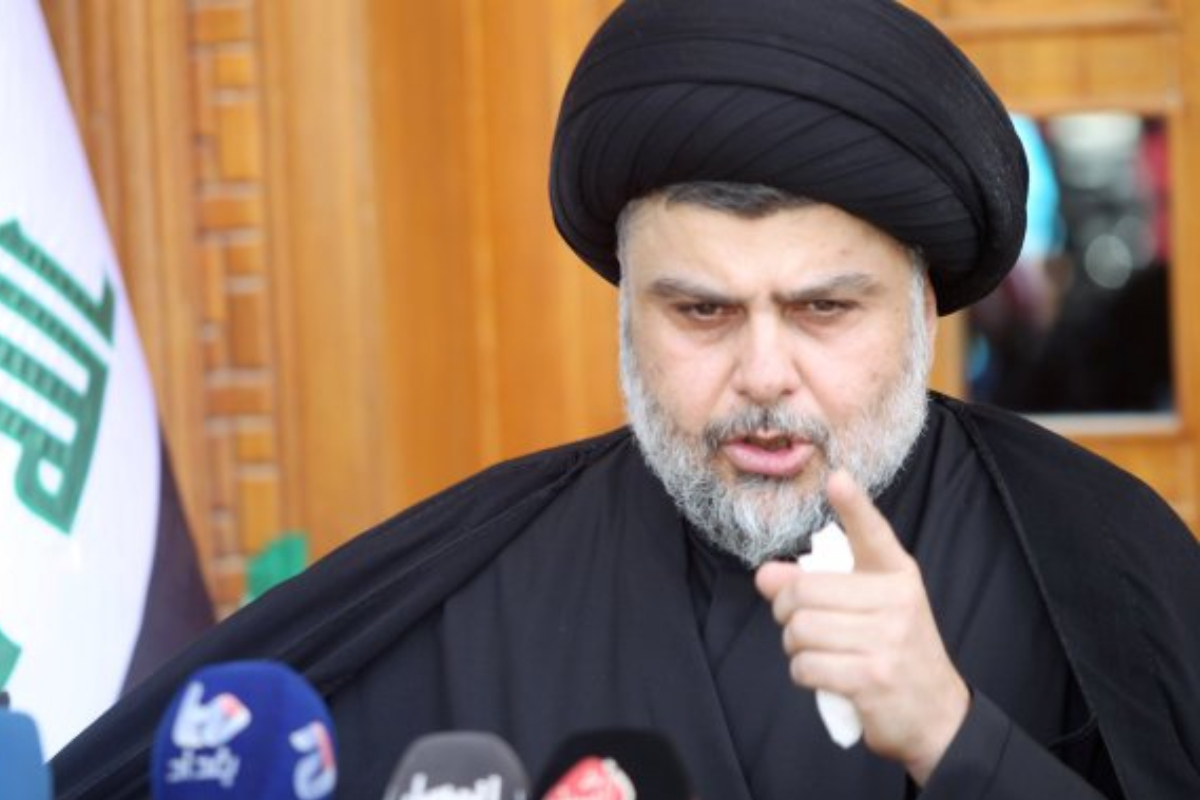The stepping down of one of the most powerful Shiite leaders in Iraq, Moqtada Al-Sadr, from public life has triggered a political quagmire. Yet again, political unrest and unprecedented violence hit Baghdad, claiming thirty lives and leaving more than four hundred people injured. The recent spate of violence occurred after Al-Sadr’s supporters stormed the Parliament building and the International Green Zone, propelling Iraq into political chaos.
Al-Sadr’s political life can be summarised as that of “running with the hare and hunting with the hounds”, as he is known for keeping one foot in the government and another in the opposition camp. He would take part in the elections and he would secure enough votes to get seats in parliament and manage ministerial posts in the government. And yet, he would also lead protests and call for reforms against that very same government.
He was one of the few Shiite leaders to remain in Iraq under Saddam Hussein’s regime and was again one of the few who openly opposed the US presence in Iraq after the 2003 invasion. Between 2004 and 2008, he led the infamous Mahdi Army militia during the sectarian divide, which also paved the way for the proliferation of Shia militias in Iraq. His militia is accused of committing atrocities on the Sunni population during that time. He was at the forefront of fighting ISIS as well.
After the 2010 elections in Iraq, Al-Sadr switched to a moderate political line and reached out to the Sunni community. Since then, he has been playing an important role in the political sphere of Iraq. He is becoming increasingly known for organising protests against the successive governments on corruption within the state and has been actively seeking an end to any foreign interference in Iraq’s politics.
Once a close ally of Iran, he eventually fell out with Tehran and became an open proponent of ending Iranian influence in Iraq by towing a strong Iraqi nationalistic line. He blamed Iran-backed political proxies for serving their vested interests and undermining those of the common people.
After his success in the 2021 parliamentary elections, Al-Sadr tried to redefine Iraqi politics by keeping the pro-Iranian Shia groups out of the government formation, thus breaking the norm of the consensus-based power sharing formula that became precedence after Saddam was ousted in 2003. This triggered a massive political backlash from the Iranian regime against him after the negotiations between him and the Quds force-backed IRGC failed to reach any settlement earlier this year.
So, despite being successful in winning the largest number of seats, neither Al-Sadr with his allies nor the pro-Iranian parties have been able to forge a coalition to succeed the caretaker Prime Minister Mustafa al-Kadhimi. The political impasse combined with immense Iranian pressure left Al-Sadr frustrated and, in June, he asked his 73 lawmakers to resign from the parliament. Since then, his supporters have been constantly clashing with the pro-Iranian proxies both politically and militarily, bringing Iraq to the cusp of the Intra-Shia war.
Iranian stakes in Iraq are extremely high as Iraq serves as a buffer and commercial gateway to the Arab world. Iraq’s geopolitical importance in Iran’s regional strategy has led Tehran to maintain an iron grip on Iraq through its militia-backed political proxies. As a western neighbour to Iran and an eastern neighbour to Syria, Iraq allows Tehran to secure a land connection to its allies in Syria and Lebanon. Especially since the start of the Syrian war and the rise of ISIS in the region, this land connection has allowed Iran-backed militias to move easily between the three countries to counter perceived threats against the Iran-led axis in the region. At the same time, this geopolitical importance makes Tehran very sensitive to the presence and activities of rival powers in Iraq.
Economically, Tehran sees Iraq as a potential market for Iranian goods as well as electricity and gas exports. It also seeks to establish trade routes to Syria, the Mediterranean, and eventually into Europe through Iraq. Thus conceding any ground in Iraq directly puts Tehran at the risk of losing out to its regional rivals like Turkey and Saudi Arabia.
As Moqtada-Al-Sadr sets himself to become the undisputed Shia political leader of Iraq, he has increasingly questioned the more progressive influence of Iran-backed Grand Ayatollah Ali Al-Sistani on the Shiite population of Iraq which forms roughly 63% of Iraq’s population. Thus, the eminent friction between Tehran-backed political proxies and Al-Sadr has further intensified to wrest control of power in Iraq.
Though anti-Iranian sentiment is growing among the common people in Iraq, Al-Sadr is cashing it in by setting up his political chessboard. It is perhaps more likely that, by disengaging from Iraq’s political institutions, Al-Sadr hopes to delegitimize what remains, setting up his return.
A majority of Iraqis have lost trust in the government, so there seems to be little legitimacy to take away. However, given his movement’s size and ability to mobilise them, Al-Sadr could use it as leverage to force early elections and return to power with more seats. Whether he does so or not remains to be seen.
In the meantime, expect Iran-backed parties to take advantage of the vacuum and further entrench themselves into Iraqi political power. The bloody political battle is on in Baghdad between the nationalist Al-Sadr and the Iranian-backed proxies, and stuck in the middle are the majoritarian Shiite population who could get further sucked into more bloodshed and violence.
Raja Muneeb is a freelance columnist
Disclaimer: Views expressed above are the author’s own










